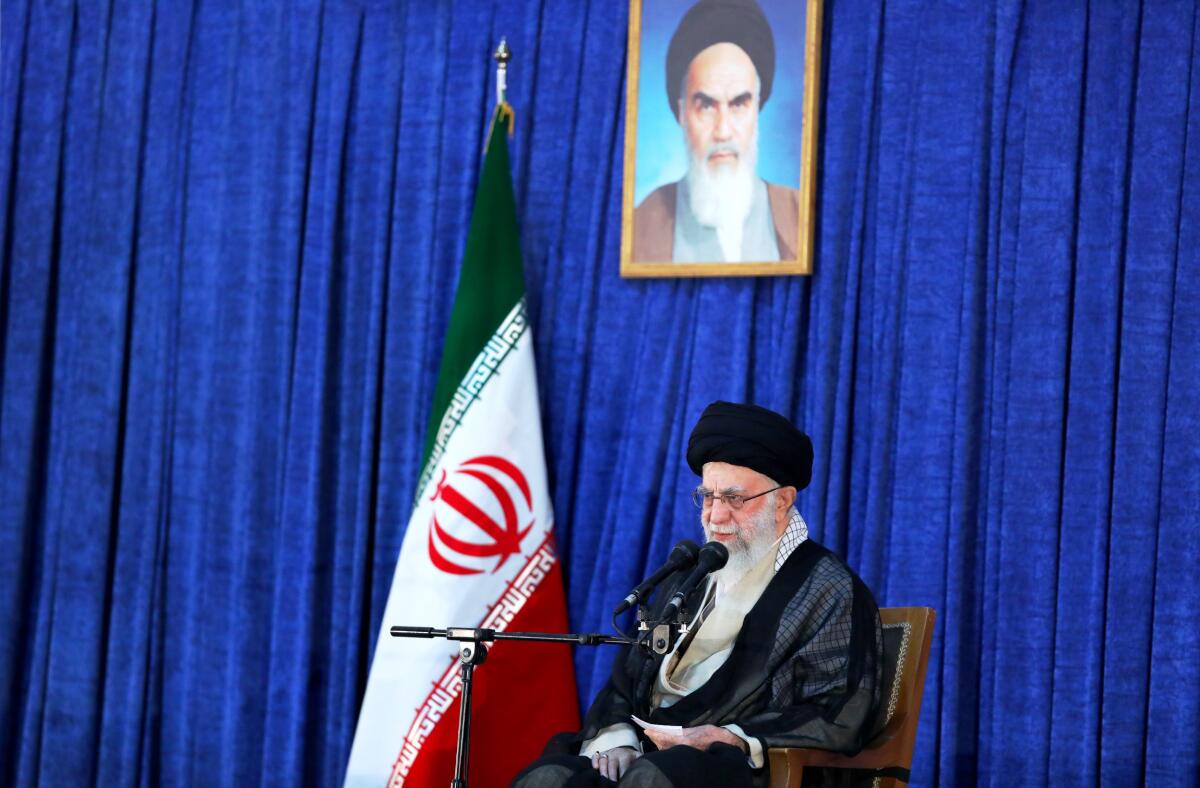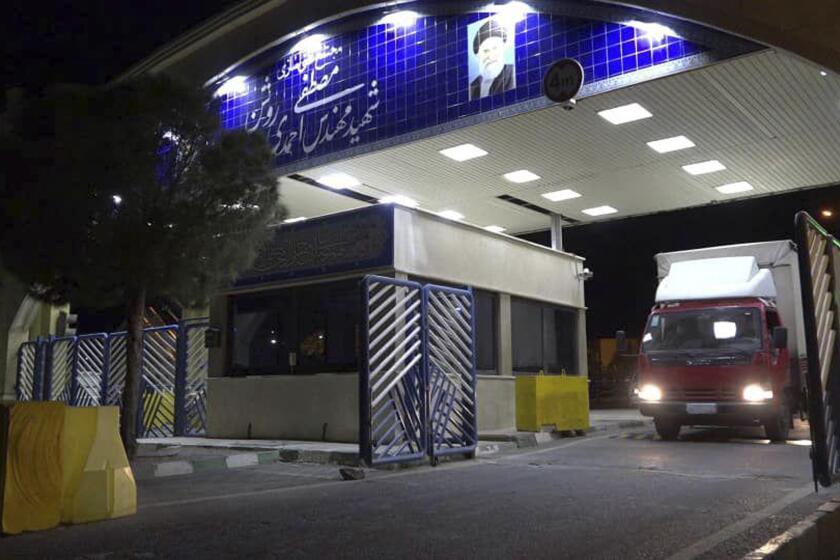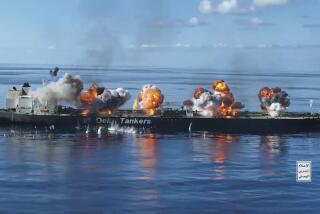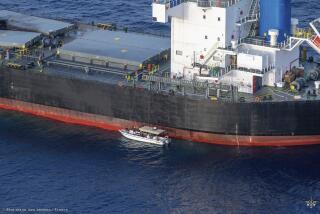Iran took oil from Greek tankers in Persian Gulf, supreme leader acknowledges

- Share via
TEHRAN — Iran’s Supreme Leader Ayatollah Ali Khamenei acknowledged Saturday that Iran took the oil from two Greek tankers last month in helicopter-launched raids in the Persian Gulf.
The confiscations were retaliation for Greece’s role in the U.S. seizure of crude oil from an Iranian-flagged tanker the same week in the Mediterranean Sea over violating Washington’s sanctions on Tehran.
“They steal Iranian oil off the Greek coast, then our brave men who don’t fear death respond and seized the enemy’s oil tanker,” Khamenei said during an 80-minute speech on the anniversary of the death of the late founder of the Islamic Republic, Ayatollah Ruhollah Khomeini. “But they use their media empire and extensive propaganda to accuse Iran of piracy.
“Who is the pirate? You stole our oil, we took it back from you. Taking back stolen property is not called stealing,” he added.
The seizures ratcheted up tensions between Iran and the West already simmering over Iran’s tattered 2015 nuclear deal with world powers. Tehran has been enriching more uranium, closer to weapons-grade levels than ever before, causing concern that negotiators won’t find a way back to the accord.
Iran’s seizure of the tankers was the latest in a string of hijackings and explosions to roil a region that includes the Strait of Hormuz, the narrow mouth of the Persian Gulf through which a fifth of all traded oil passes. The incidents began after then-President Trump unilaterally withdrew the U.S. from the nuclear deal, which saw Tehran drastically limit its enrichment of uranium in exchange for the lifting of economic sanctions.
The U.S. Navy blamed Iran for a series of limpet mine attacks on vessels that damaged tankers in 2019, as well as for a fatal drone attack on an Israeli-linked oil tanker that killed two European crew members in 2021.
Iranian hijackers also stormed and briefly captured a Panama-flagged asphalt tanker off the United Arab Emirates last year and briefly seized and held a Vietnamese tanker in November.
Tehran denies carrying out the attacks, but a wider shadow war between Iran and the West has played out in the region’s volatile waters. Tanker seizures have been a part of it since 2019, when Iran seized the British-flagged Stena Impero after the United Kingdom detained an Iranian oil tanker off Gibraltar. Iran released the tanker months later as London also released the Iranian vessel.
Iran last year also seized and held a South Korean-flagged tanker for months amid a dispute over billions of dollars of frozen assets Seoul holds.
Satellite images analyzed by the AP on Wednesday confirmed that one of the two tankers remained off the coast of the Iranian port city of Bandar Abbas. Planet Labs PBC images from Tuesday showed the Prudent Warrior between Bandar Abbas and Iran’s Qeshm Island near the Strait of Hormuz.
It remained unclear where the second ship, the Delta Poseidon, was.
Iranian state TV reports that members of a “network” working for Israel who were arrested had planned to sabotage the nuclear facility at Fordo.
Talks in Vienna on the nuclear deal have been stalled since April. Since the deal’s collapse, Iran has run advanced centrifuges and has a rapidly growing stockpile of enriched uranium. Nonproliferation experts warn that Iran has enriched enough uranium up to 60% purity — a short technical step from the weapons-grade level of 90% — to make one nuclear weapon if it chooses.
Iran says its program is for peaceful purposes, though United Nations experts and Western intelligence agencies say Tehran had an organized military nuclear program through 2003.
Khamenei, who has final say on all state matters, in his speech Saturday also accused the U.S. of supporting recent protests in Iran sparked by price hikes and the slashing of subsidies by the government. Teachers for weeks also demonstrated in favor of better pay and working conditions.
The value of the Iranian currency, the rial, has been weakening for years but recently tumbled to new lows, reflecting growing anxiety over Iran’s economy.
Khamenei criticized what he called the decades-long U.S. opposition to the nation and said Washington pins its hopes to such protests.
The octogenarian said Iran’s enemies try to pit Iranian citizens “against the Islamic system” through psychological warfare, the internet and financial support.
More to Read
Sign up for Essential California
The most important California stories and recommendations in your inbox every morning.
You may occasionally receive promotional content from the Los Angeles Times.











